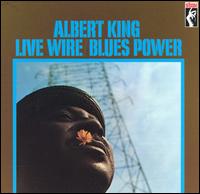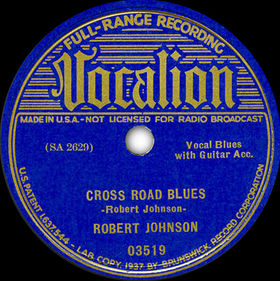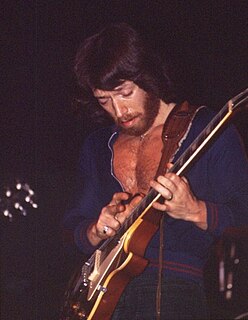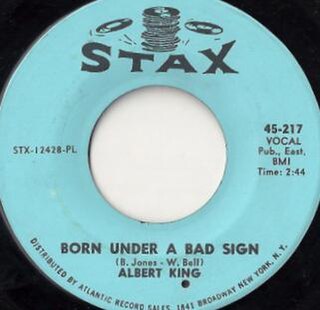
Michael Bernard Bloomfield was an American guitarist and composer, born in Chicago, Illinois, who became one of the first popular music superstars of the 1960s to earn his reputation almost entirely on his instrumental prowess, as he rarely sang before 1969. Respected for his guitar playing, Bloomfield knew and played with many of Chicago's blues musicians before achieving his own fame and was instrumental in popularizing blues music in the mid-1960s. In 1965, he played on Bob Dylan's Highway 61 Revisited, including the single Like a Rolling Stone, and performed with Dylan at that year's Newport Folk Festival.

Albert Nelson, known by his stage name Albert King, was an American blues guitarist and singer whose playing influenced many other blues guitarists. He is perhaps best known for the popular and influential album Born Under a Bad Sign (1967) and its title track. He, B.B. King, and Freddie King, all unrelated, were known as the "Kings of the Blues." The left-handed King was known for his "deep, dramatic sound that was widely imitated by both blues and rock guitarists."

Freddie King was an American blues guitarist, singer and songwriter. He is considered one of the "Three Kings of the Blues Guitar". Mostly known for his soulful and powerful voice and distinctive guitar playing, King had a major influence on electric blues music and on many later blues guitarists.

Otis Rush Jr. was an American blues guitarist and singer-songwriter. His distinctive guitar style featured a slow-burning sound and long bent notes. With qualities similar to the styles of other 1950s artists Magic Sam and Buddy Guy, his sound became known as West Side Chicago blues and was an influence on many musicians, including Michael Bloomfield, Peter Green and Eric Clapton.

Live Wire/Blues Power is a blues album by Albert King, recorded live in June 1968 at the Fillmore Auditorium. This was Albert King's first live album. Leftovers from these live recordings were released later in 1990 in the albums Wednesday Night in San Francisco and Thursday Night in San Francisco.

Blues for Elvis – King Does the King's Things is the fifth studio album by Albert King. The songs in this album are versions of songs previously recorded by Elvis Presley. On the album sleeve there is a review by Albert Goldman, music critic of Life magazine, who says, among other things: "For the first time on record, the King of Blues is meeting the King of Rock." and "...you're gonna love every minute of this musical feast fit for kings.".

Wednesday Night in San Francisco is a blues album by Albert King, recorded live in 1968 at the Fillmore Auditorium. This album, together with Thursday Night in San Francisco, contains leftovers recorded live on the same dates as Live Wire/Blues Power. Wednesday Night in San Francisco, released in 1990, contains material recorded on June 26, 1968.

Blues at Sunrise is a blues album by Albert King, recorded live at the Montreux Jazz Festival, and released in 1988. Material recorded on the 1973 Montreux festival was also released in his albums Montreux Festival and Blues at Sunset.
"Red House" is a song written by Jimi Hendrix and one of the first songs recorded in 1966 by the Jimi Hendrix Experience. It has the musical form of a conventional twelve-bar blues and features Hendrix's guitar playing. He developed the song prior to forming the Experience and was inspired by earlier blues songs.

"Cross Road Blues" is a blues song written and recorded by American blues artist Robert Johnson in 1936. Johnson performed it as a solo piece with his vocal and acoustic slide guitar in the Delta blues-style. The song has become part of the Robert Johnson mythology as referring to the place where he supposedly sold his soul to the Devil in exchange for his musical talents, although the lyrics do not contain any specific references.

"Rollin' and Tumblin'" is a blues standard first recorded by American singer-guitarist Hambone Willie Newbern in 1929. Called a "great Delta blues classic", it has been interpreted by hundreds of Delta and Chicago blues artists, including well-known recordings by Muddy Waters. Rock musicians usually follow Waters' versions, with the 1960s group Cream's rendition being perhaps the best known.

Live at San Quentin is a 1990 live album by blues guitarist B.B. King performed at San Quentin State Prison in Marin County, California.

Bobby Bland and B. B. King Together Again...Live is a live album recorded in 1976 at the Coconut Grove in Los Angeles by Bobby Bland and B. B. King.

Harvey Mandel is an American guitarist known for his innovative approach to electric guitar playing. A professional at twenty, he played with Charlie Musselwhite, Canned Heat, the Rolling Stones, and John Mayall as well as maintaining a solo career. Mandel is one of the first rock guitarists to use two-handed fretboard tapping.

"Born Under a Bad Sign" is a blues song recorded by American blues singer and guitarist Albert King in 1967. Called "a timeless staple of the blues", the song also had strong crossover appeal to the rock audience with its synchronous bass and guitar lines and topical astrology reference. "Born Under a Bad Sign" became an R&B chart hit for King, and numerous blues and other musicians have made it perhaps the most recorded Albert King song.

In Session is a blues album by Albert King with Stevie Ray Vaughan recorded live for television on December 6, 1983, at CHCH-TV studios in Hamilton, Ontario, Canada, when Vaughan was 29 and King was 60. It was released as an album on August 17, 1999 and re-released with a supplemental video recording on DVD on September 28, 2010. It has also been released on CD and SACD.

"The Sky Is Crying" is a blues standard written and initially recorded by Elmore James in 1959. Called "one of his most durable compositions", "The Sky Is Crying" became a R&B record chart hit and has been interpreted and recorded by numerous artists.
"We Gonna Move to the Outskirts of Town" is a song recorded September 3, 1936, by Piedmont blues musician Casey Bill Weldon. Weldon performed it as a solo piece with vocal and acoustic guitar.

Live at Sugar Hill is a live album by blues musician John Lee Hooker recorded in California in 1962 and released by the Galaxy label. The album was reissued in 1974 by Fantasy as the first disc of the double LP Boogie Chillun which added ten additional previously unreleased recordings from the same concerts.

Rockin' Wild in Chicago is a live album by the American blues musician Magic Sam, compiling tracks recorded in Chicago between 1963 and 1968, that was released by the Delmark label in 20021.


















